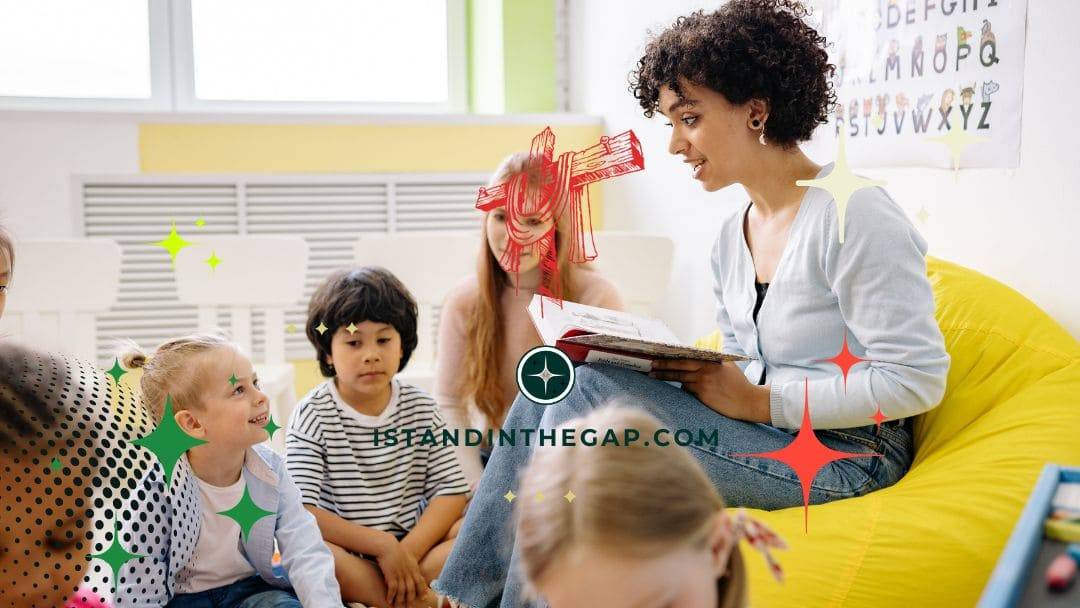Teaching children respect is not just about manners, but about instilling empathy, responsibility, and social skills. Parents have to teach children respect for it’s a fundamental value that plays a crucial role in shaping a child’s character and behavior.
In this article, we will explore the significance of respect in building positive relationships and developing crucial life skills. We will also delve into practical ways parents can teach respect to their children, drawing insights from Proverbs 20:20.
Join us as we uncover the profound impact of teaching children respect.
Key Takeaways:
- Teaching children respect builds positive relationships and promotes empathy, social skills, and responsibility.
- Parents can lead by example, set clear expectations and consequences, encourage empathy, and teach problem-solving to instill respect.
- Proverbs 20:20 reminds us to discipline with love, be consistent and firm, teach and correct, and promote mutual respect and understanding in teaching children respect.
Anchor Bible Verse
Whoever curses his father or his mother,
– Proverbs 20:20 (NKJV)
His lamp will be put out in deep darkness.
In Proverbs 20:20 we learn the importance of teaching children respect for their parents. It warns that disrespect toward parents leads to darkness and loss.
What Is Respect?
Respect, as inferred in Proverbs 20:20, encompasses a deep understanding of honoring and valuing others in our interactions.

Respect serves as a fundamental building block in establishing healthy relationships, whether it be in personal, professional, or social settings.
It involves considering the feelings, opinions, and boundaries of others, and fostering a harmonious environment of mutual understanding and cooperation.
Communication thrives on a foundation of respect, where individuals listen attentively, speak kindly, and show empathy toward each other’s perspectives.
By demonstrating empathy, individuals acknowledge the emotions and experiences of others, creating a space for open dialogue and genuine connection.
Respect extends beyond individual relationships to shape societal norms and behaviors. It is the cornerstone of a civil society, guiding individuals to uphold integrity, fairness, and compassion in their interactions with diverse communities.
Why Is Teaching Children Respect Important?
Teaching children respect is crucial as it lays the foundation for positive relationships, empathy, and responsible behavior in their formative years.
Children who are taught to respect others from a young age are more likely to develop strong social skills that enable them to interact effectively with people from all walks of life.
Respect fosters empathy, allowing them to understand and appreciate differing perspectives, leading to improved communication and conflict resolution abilities.
This foundational value also contributes to the cultivation of emotional intelligence, giving the power to children to navigate complex emotions and regulate their behavior maturely and respectfully.
Builds Positive Relationships
Teaching children respect fosters healthy relationships built on trust, understanding, and mutual appreciation.
One effective strategy for instilling respect in children involves leading by example.
Children often learn by observing the actions and behaviors of adults around them. By demonstrating respectful behavior in day-to-day interactions, adults can set a positive example for children to follow.
This can include showing kindness, valuing differences, and treating others with empathy and consideration.
Promotes Empathy and Understanding
Instilling respect in children encourages empathy towards others and a deeper understanding of diverse perspectives.
Teaching respect is not just about manners, but a key building block in shaping a child’s character. By fostering an environment of mutual respect, children learn to appreciate the differences in opinions and experiences.
This creates a sense of empathy that allows them to connect with others on a deeper level.
When children are taught the value of respect, they are more likely to show kindness and consideration towards their peers and the community.
This promotes a culture of inclusivity and support, where everyone feels understood and valued.
Develops Social Skills
Learning respect equips children with essential social skills to navigate diverse environments and interact respectfully with individuals from varying backgrounds.
By instilling respect for diversity in children, not only do they learn to appreciate differences, but they also develop empathy and understanding towards others.
This, in turn, plays a crucial role in fostering their social competence and inclusivity.
Encouraging them to engage in activities that celebrate various cultures, traditions, and perspectives further reinforces the value of respect in their interactions.
Through consistent modeling of respect in daily routines, children internalize the importance of treating others with dignity and kindness, thus shaping their behavior positively toward creating a more inclusive and harmonious environment.
Teaches Responsibility
By teaching respect, children learn the importance of responsibility, accountability, and respecting authority figures in their lives.
Understanding that respect goes hand in hand with responsibility is crucial in shaping a child’s character.
When children are taught to respect others, they develop a sense of empathy and consideration for those around them. This, in turn, instills a sense of duty and ownership in their actions, as they comprehend the impact of their behavior on others.
Setting clear boundaries and consequences reinforces the connection between respect and accountability.
By acknowledging the repercussions of their actions, children understand the gravity of their choices and strive to act in a manner that upholds the values of respect and responsibility.
How Can Parents Teach Children Respect?
Parents can effectively teach respect by reinforcing positive behaviors, addressing challenges, and nurturing a culture of respect within the family.
One practical way to reinforce respectful behavior is to model it yourself. Children learn a lot by observing their parents, so demonstrating respectful communication and actions can have a significant impact.
Setting clear expectations and boundaries around respectful behavior is essential. Consistency in enforcing these rules shows children the importance of respect.
Positive reinforcement, such as praising and rewarding respectful behavior, can also encourage children to continue acting respectfully.
This creates a cycle of positive behavior that reinforces the value of respect within the family dynamic.
Lead by Example
Leading by example is paramount in demonstrating the impact of respectful behavior on fostering a harmonious and inclusive home environment.
When family members witness respectful conduct from each other, it sets the tone for interactions within the household.
Simple acts like active listening, praising one another, and offering help without being asked can go a long way in promoting mutual respect.
Creating a routine for family meetings where everyone has a chance to share their thoughts and feelings freely can also contribute to a respectful atmosphere.
Encouraging open communication, acknowledging each other’s perspectives, and validating emotions are key elements that foster empathy and understanding within the family dynamic.
Set Clear Expectations and Consequences
Establishing clear expectations and appropriate consequences helps children understand the importance of respecting authority figures and following guidelines with love and understanding.
When children are taught discipline infused with a sense of love and understanding, it creates a foundation for them to internalize the values of respect for authority.
By setting boundaries in a nurturing manner, caregivers and educators guide children toward understanding the significance of rules and expectations.
Consistent enforcement of consequences reinforces the notion that behaviors have outcomes, instilling a sense of responsibility and accountability in children.
This approach not only shapes respectful behavior but also cultivates a sense of empathy and consideration towards others.
Encourage Empathy and Perspective-Taking
Promoting empathy and teaching problem-solving skills give the power to children to resolve conflicts peacefully and understand the impact of their actions on others.
Encouraging empathy-building activities and sharing stories that highlight kindness and understanding can help children develop a deeper sense of compassion toward others.
By fostering a culture of open communication and practicing active listening, parents can guide their children in valuing diverse perspectives and finding common ground in disagreements.
- Teaching children conflict resolution techniques such as negotiation, compromise, and seeking win-win solutions equips them with essential skills to navigate conflicts constructively.
- Engaging in role-playing scenarios or using real-life examples to demonstrate the importance of empathy in resolving disputes can be a powerful way to instill these values in children.
Teach Problem-Solving and Conflict Resolution
Empowering children with problem-solving and conflict-resolution skills instills a sense of justice, honesty, and trustworthiness in their interactions with others.
By teaching children how to navigate conflicts effectively, we equip them with essential tools to handle disagreements with fairness and integrity.
When youngsters learn to communicate openly and listen actively, they cultivate a resilient foundation for resolving disputes constructively.
Encouraging them to consider multiple perspectives and seek mutually agreeable solutions fosters a culture of respect and understanding.
Through these practices, children not only learn practical problem-solving skills but also internalize values of empathy and cooperation, fostering a harmonious and trusting relationship with their peers.
What Can We Learn from Proverbs 20:20 about Teaching Children Respect?
Proverbs 20:20 offers timeless wisdom on disciplining children with love, consistency, and a focus on instruction rather than mere punishment.
It emphasizes the importance of using discipline as a tool for growth and learning, rather than simply as a form of retribution. Parents are encouraged to correct their children with a mindset of nurturing and guidance, aiming to shape their character and moral compass.
By fostering an environment of mutual respect and understanding, parents can effectively cultivate a relationship built on love and discipline.
This approach not only teaches children boundaries and consequences but also instills respect for authority and values in them.
Discipline with Love
The concept of discipline with love mirrors God’s nurturing guidance, akin to a farmer tending to the land for a bountiful harvest.
Just as a farmer carefully tends to each plant, providing water, sunlight, and nutrients in the right balance, parents nurture their children with gentle guidance and firm boundaries.
There are times when the farmer does pruning for the
It is through this cultivation of respect that children thrive and grow, much like crops flourishing under the watchful care of a dedicated farmer. The root of discipline and love lies in fostering an environment where growth and development can take place harmoniously, much like the balanced ecosystem created by a skilled farmer in the fields.
Be Consistent and Firm
Consistency and firmness in discipline reflect wisdom in steering children away from folly and evil, akin to the Lord guiding His people toward righteousness.
Regarding redirecting children from harmful behaviors, consistency and firmness play a pivotal role in setting clear boundaries and expectations.
Parents and caregivers who consistently enforce rules and consequences not only establish a sense of security for the child but also convey the message that certain behaviors are non-negotiable.
This approach, embedded with wisdom, helps children understand the importance of respect and accountability.
Teach and Correct, Not Just Punish
Teaching and correcting children with integrity and a spirit of guidance helps them recognize and rectify their mistakes, fostering a culture of honesty and accountability.
By embodying values such as honesty and accountability in our interactions with children, we not only shape their behavior but also their character.
Parents must remember that the goal of teaching and correction is not just to discipline but to guide and nurture, helping children learn from their errors and grow into responsible individuals.
Choosing to focus on positive reinforcement and constructive feedback rather than punitive measures can create a supportive environment that encourages self-reflection and personal development.
Promote Mutual Respect and Understanding
Promoting mutual respect and understanding between parents and children cultivates wisdom, harmony, and peaceful interactions within the family unit.
Respect is a two-way street, essential for fostering strong relationships within the family. When parents demonstrate respect towards their children, they create an environment where the children feel valued and understood.
Similarly, when children show respect towards their parents, it builds trust and opens the doors for effective communication.
Modeling wisdom and patience in interactions sets a powerful example for children to emulate. By handling disagreements calmly and discussing issues openly, parents teach children constructive ways to resolve conflicts and express their feelings.
Conclusion: The Impact of Teaching Children Respect
The role of parents in teaching children respect extends far beyond behavior correction; it shapes the moral compass, character, and future relationships of the next generation.
Parental guidance serves as the cornerstone for fostering respect in children, influencing their worldviews and interactions with others. By modeling respectful behavior and instilling values of kindness and empathy, parents help cultivate a culture of understanding and consideration in their offspring.
This nurturing environment not only impacts how children treat others but also shapes their self-perception and confidence.
Through consistent reinforcement of respectful attitudes and teachings, parents lay the foundation for their children to become conscientious, compassionate individuals who contribute positively to society.
Frequently Asked Questions
Why is it important to teach children respect?
Teaching children respect is crucial because it helps them develop positive relationships with others, builds character, and prepares them for success in the future. Respect is also a vital component of a healthy society and promotes empathy and understanding.
How can teaching children respect improve their relationships?
By teaching children respect, they learn to communicate effectively, listen actively, and consider the feelings of others. This leads to healthier and more meaningful relationships with peers, authority figures, and future partners.
What role do parents play in teaching children respect?
Parents are the primary role models for children and play a crucial role in teaching them respect. By modeling respectful behavior, setting clear boundaries, and reinforcing positive behavior, parents can help children develop a strong sense of respect for others.
What can children learn from Proverbs 20:20 about respect?
Proverbs 20:20 states, “Whoever curses their father or mother, their lamp will be snuffed out in pitch darkness.” This verse highlights the importance of respecting one’s parents and authority figures, as disrespect can lead to negative consequences.
How can teaching respect benefit children in the long run?
Teaching children respect at a young age can have long-term benefits. They are more likely to excel in school, have better job prospects, and maintain healthy relationships in adulthood. Respect is also a vital characteristic of good leaders.
What are some practical ways to teach children respect?
Some practical ways to teach children respect include setting consistent and clear expectations, providing positive reinforcement, encouraging empathy and understanding, and modeling respectful behavior. It is also essential to communicate openly and have discussions about respect and its importance.

















